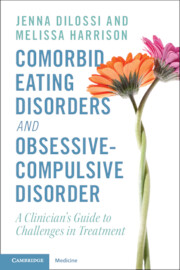 Comorbid Eating Disorders and Obsessive-Compulsive Disorder
Comorbid Eating Disorders and Obsessive-Compulsive Disorder from Part III - Evidence-Informed Considerations for Assessment and Treatment
Published online by Cambridge University Press: 14 December 2023
After gathering important information during the assessment process, clinicians can begin working with their patients to collaboratively develop a conceptualization of the patient’s disorder. This early phase of treatment provides an opportunity for clinicians to educate patients about their disorders, including the complex nature of comorbid OCD and EDs, and obtain informed consent for treatment. Informed consent is essential as it ensures that patients understand the treatment options, their potential risks and benefits, and the uncertainty surrounding the best course of treatment for this comorbidity. A functional analysis, which assesses the purpose and function of the patient’s behaviors, can provide valuable data for creating a treatment plan. By understanding the root and function of the patient’s behaviors, it will be possible to prioritize treatment and develop a promising treatment plan. Additionally, it is crucial for clinicians to assess the impact of malnutrition or weight loss on the patient, as this will inform treatment planning and may affect the course of treatment.
To save this book to your Kindle, first ensure [email protected] is added to your Approved Personal Document E-mail List under your Personal Document Settings on the Manage Your Content and Devices page of your Amazon account. Then enter the ‘name’ part of your Kindle email address below. Find out more about saving to your Kindle.
Note you can select to save to either the @free.kindle.com or @kindle.com variations. ‘@free.kindle.com’ emails are free but can only be saved to your device when it is connected to wi-fi. ‘@kindle.com’ emails can be delivered even when you are not connected to wi-fi, but note that service fees apply.
Find out more about the Kindle Personal Document Service.
To save content items to your account, please confirm that you agree to abide by our usage policies. If this is the first time you use this feature, you will be asked to authorise Cambridge Core to connect with your account. Find out more about saving content to Dropbox.
To save content items to your account, please confirm that you agree to abide by our usage policies. If this is the first time you use this feature, you will be asked to authorise Cambridge Core to connect with your account. Find out more about saving content to Google Drive.